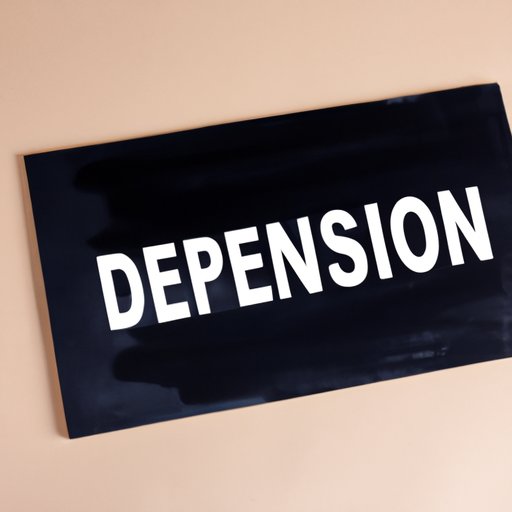
Introduction
Weight gain is a common symptom of depression. Individuals with depression are more likely to gain weight than those without depression. This connection between depression and weight gain has been studied and discussed for many years. In this article, we explore the connection between depression and weight gain and how it can impact individuals. We also provide tips and strategies to manage weight gain symptoms and address the negative stigma often associated with depression and obesity.
The Missing Link Between Depression and Weight Gain
Research studies suggest that there is a connection between depression and weight gain. However, the underlying causes of this connection are not fully understood. Physiologically, depression may cause hormonal imbalances that can lead to increased appetite and weight gain. Therefore, individuals with depression are more prone to overeating and consuming unhealthy foods, leading to weight gain and obesity.
On a psychological level, depression can cause feelings of hopelessness and low self-esteem, which can lead to unhealthy eating habits. People may also turn to food as a coping mechanism, overeating to manage feelings of sadness and hopelessness.
The Vicious Cycle: How Depression and Weight Gain Feed off each Other
Depression and weight gain have a cyclical relationship. People with depression are more prone to unhealthy eating patterns, which can lead to weight gain. This weight gain, in turn, can lead to increased depression symptoms. Weight gain can also impact self-esteem and confidence, leading to even more depression and unhealthy eating patterns. This vicious cycle can be difficult to break and can significantly impact an individual’s physical and emotional wellbeing.
Unpacking Weight Gain and Depression: A Comprehensive Guide
Depression and weight gain go hand in hand. People on antidepressant medication or other medications used to manage depression may experience weight gain as a side effect. Hormonal changes caused by depression can also lead to weight gain. Mood changes associated with depression can impact eating patterns and lead to overeating. Depression can also cause insomnia or poor sleep patterns, which can hinder metabolism and lead to weight gain.
Managing depression symptoms and weight gain can be challenging. However, exercise, healthy eating, and therapy are effective tools in managing these symptoms. Simple lifestyle changes like choosing a healthy diet and engaging in regular physical activity can help in managing weight gain and depression symptoms. Therapy can also help in understanding and managing mental health issues that may lead to unhealthy eating patterns and weight gain.
Addressing the Elephant in the Room: When Depression Leads to Obesity
People with depression are often judged more harshly, especially when they struggle with their weight. Obesity and depression are common factors that can impact an individual’s quality of life. However, social stigma often associated with these conditions can make it even more challenging for a person to manage their weight gain and depression symptoms. It’s essential to address this negative social stigma to create an environment that is supportive of people seeking help in managing their mental and physical health.
A New Look at Old Ideas: Can Weight Loss Help Ease Depression?
Research suggests a link between losing weight and improved mental health. Losing weight can lead to decreased anxiety and depressive symptoms, improved self-esteem and confidence. Engaging in regular physical activity and improving nutrition can also help with depression symptoms. Exercise releases feel-good chemicals called endorphins, which can alleviate depression and anxiety symptoms.
Real Stories of Real People: How Depression and Weight Gain Impact Lives
Personal stories provide insight into the experiences of individuals dealing with depression and weight gain. Personal stories can empower individuals to seek help and support in managing their mental and physical health. Therefore, it’s crucial to share personal stories of individuals who have struggled with depression and weight gain and offer practical advice based on their experiences.
Conclusion
In conclusion, depression and weight gain are interconnected, making it difficult for individuals to manage their mental and physical health. However, understanding the underlying causes and risks associated with depression and weight gain is a step towards managing symptoms. Engaging in regular physical activity, making healthy dietary choices, and incorporating therapy can help manage symptoms and improve mental health. It’s essential to address social stigma and prioritize mental and physical wellbeing in supporting individuals dealing with depression and weight gain. If you or someone you know is struggling with depression and weight gain, please seek professional help for further support on managing these symptoms.




